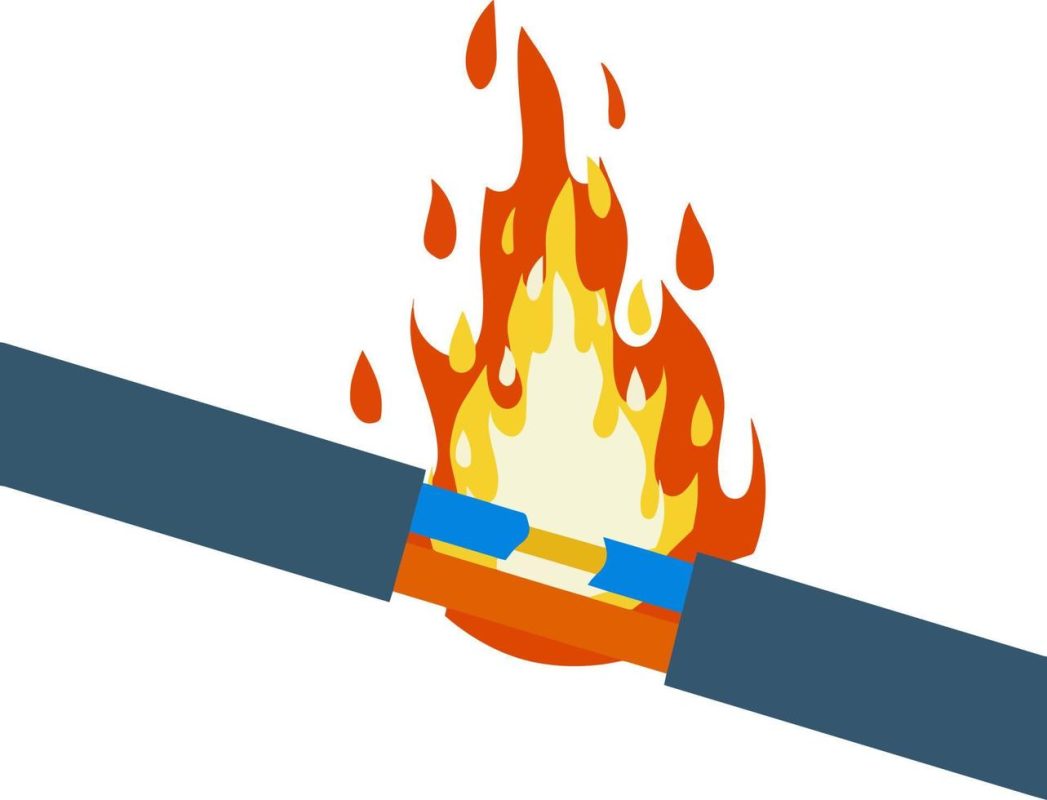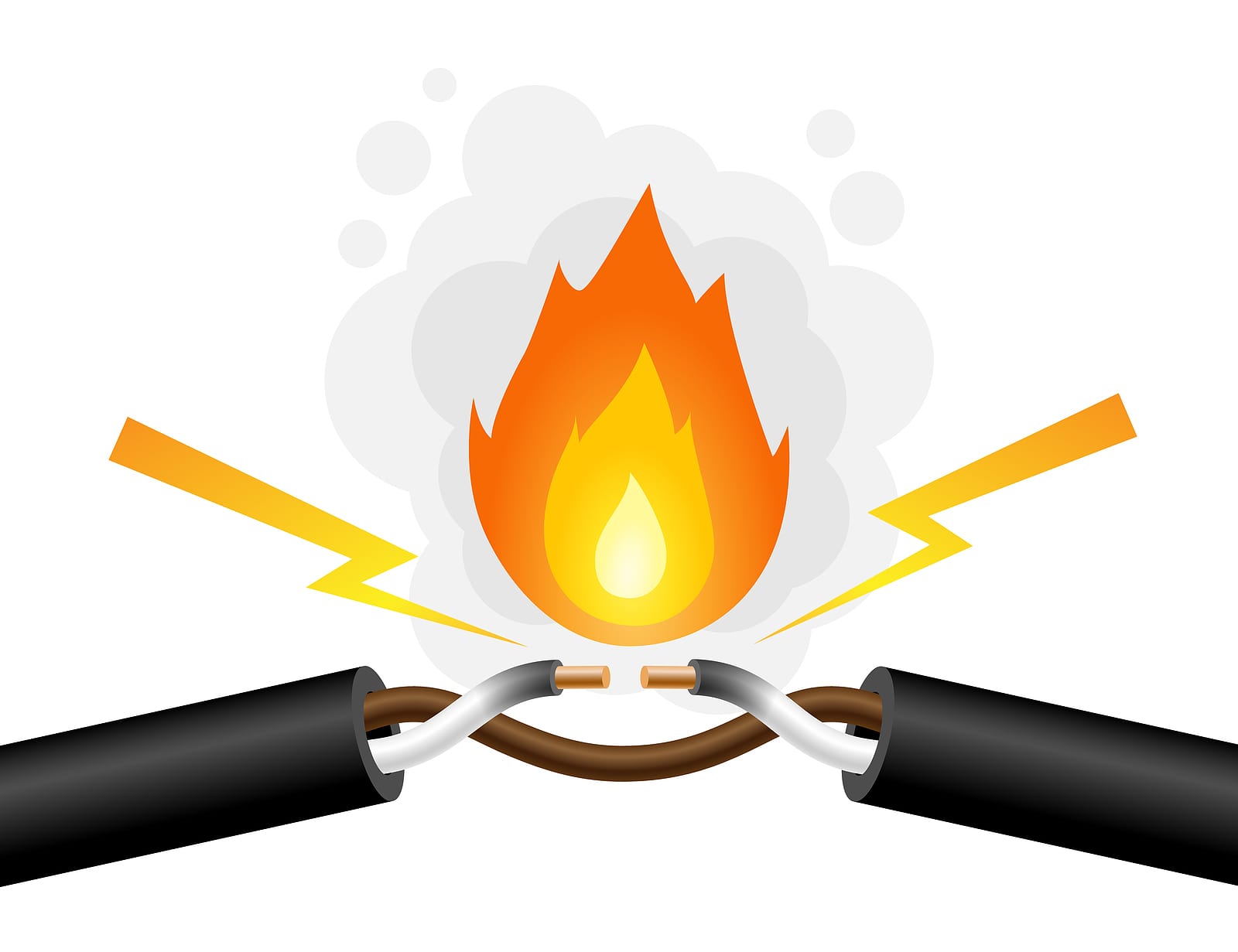According to the report of the International Electrical Safety Foundation, more than 50,000 fires occur in homes and industrial environments every year, leaving nearly 500 dead and more than 1,400 injured. Residential property damage is over a billion dollars and is one of the leading causes of electrical fires.
Before going to the causes of fire caused by electricity, it is better to familiarize yourself with the following points:
- Fires often occurred in one- and two-person houses (83%).
- More fires occurred in late January (12%) due to increased use of heating appliances.
- In only 17% of fires, the spread of the fire is limited to the object that started the fire.
- Most fires start in bedrooms (15%) and bedrooms or spaces empty of people (13%).
- Although most fires start in the bedroom, the highest number of fatalities are from fires located in the living room and cozy areas of the home.
- The most materials that ignite in this type of fire are electrical wires and their insulation (31%) and materials related to the construction of residential houses (18%).
- The most important factors that contribute to the ignition of electrical installations in residential buildings are: defects in electrical equipment (43%), short circuit arc due to unknown reasons (23%) and short circuit arc caused by insulation and electrical wear. . Equipment and facilities (11 percent).
Causes of electrical fires

Electrical systems are a constant fire hazard. Understanding the common causes of electrical fires and following preventative measures to maintain electrical systems will reduce your chances of a fire.
Poor maintenance
Poor maintenance of electrical equipment is one of the main causes of electrical fires. Regular maintenance of panels, electrical equipment, wires, etc. reduces the risk of fire. One of the types of maintenance includes removing dirt and dust and inspecting and replacing defective circuit breakers.
Old equipment and tools
Old electrical equipment and appliances cause electrical fires. According to the United States Fire Department, 19% of non-residential fires and 13% of residential fires are due to old or malfunctioning appliances. It is electricity. Replacing old and defective electrical equipment greatly reduces the risk of electrical fires.
Fire caused by lighting fixtures
Another major cause of electrical fires is lights. Installing improper lamps that have more wattage than the power supply circuit and related connections will cause fire. To prevent this from happening, you must install each lamp before installation. In the environment, pay attention to the maximum wattage of the lamp and never connect more than the capacity of the circuit to that lamp.
Other causes of fire caused by lighting devices include placing materials such as cloth or paper on the lamp. If this is done, the material will be exposed to heat and ignite. Also, the use of defective lamps and if they do not have the necessary standards, they cause fire.
In industrial and high-risk environments, explosion-proof lights should be used to prevent fires and explosions. Otherwise, the possibility of explosion and fire in these areas will increase a lot.
Fire caused by wiring
Non-standard wiring or old wiring can cause fire in the environment. Suppose a house is more than 20 years old, the wiring of this house may exceed the capacity of the electrical installation implemented in it to feed more amounts. TV and game console, microwave, cooler, etc., as a result, more current than its capacity is taken from the circuit. This could cause a fire. be in the environment
In industrial environments, even a small spark caused by a cable or wire can cause an explosion and fire. To prevent fire caused by cables in industrial and dangerous environments, explosion-proof glands and explosion-proof cables should be used.
Causes of fire and explosion caused by cables
- Insulation destruction: The most common cause of cable failure is insulation destruction. Over time, the insulation of cables may deteriorate due to exposure to heat, moisture, mechanical stress, or exposure to chemicals.
- Overload: When a cable is subjected to more electrical current than it is designed for, it can overheat and eventually fail, potentially leading to an explosion.
- Short Circuit: A short circuit occurs when two conductors in a cable come into contact, causing excessive current to flow, which can lead to overheating and explosion.
- Physical damage: If the cable is physically damaged, such as cut, crushed, or punctured, the electrical insulation may be damaged, increasing the risk of sparks or explosions.
- Environmental Factors: Cables exposed to extreme temperature, humidity, or other environmental factors may become damaged or degraded over time, increasing the risk of explosion.
- Poor installation: If the cable is not installed properly or the cable conduit used to secure the cable is not environmentally friendly, the cable may become loose or displaced, potentially causing a spark or explosion.
Not complying with safety codes
Because of the increasing demand for electricity, it is important to stay up-to-date on safety codes. Old wiring that does not support the current demand is common in older homes and commercial spaces. Old wiring can cause fires, especially if the wire Do not match the current of the circuit. Ensuring that the wiring matches the current of the circuit and is free of defects is an easy way to prevent electrical fires.
Electrical panels and circuit breakers
A circuit breaker protects the electrical circuit from damage by automatically turning off the circuit power. If the circuit breaker fails, it can damage appliances or equipment in the circuit and cause a fire. Keeping the board up to date Power and circuit breakers reduce the amount of failure.
There are various reasons that can cause fires in electrical panels:
- Loose electrical panel connections can cause a fire in the electrical panel.
- Consuming more than the allowed amperage will increase the heat and fire in the electrical panels. To prevent this from happening, protective relays must be used.
- Unbalanced load in three-phase systems increases heat and causes fire in electrical panels.
- Using an improper cable washer causes an increase in heat in the panels, resulting in a fire.
- Not using cable washers or wires or using non-standard wires.
- Using low-quality conductors and insulators can increase heat due to electrical losses and cause fire and sparks.
- Not using spring or solar washers in electrical panels.
- Placing two or more cables on top of each other can reduce the contact area and increase the heat, resulting in a panel fire.
- Placing a washer or nut between the cable bush and the busbar. Note that the cable washer must be in direct contact with the busbar. Otherwise, the contact surface will decrease and it will be accompanied by an increase in resistance and temperature.
- The imbalance between the load and the cross-section of the conductors causes the conductor to heat up and, as a result, fire.
- Not using the side vents increases the temperature inside the panel.
In industrial and high-risk places, explosion-proof boxes and explosion-proof electrical panels must be used to prevent explosions and fires.
Fire caused by electric heaters
Because these types of heaters are portable, many times people place them too close to combustible surfaces such as curtains, beds, clothes, chairs, sofas, and carpets, and they become so hot that almost immediately any combustible surface is burned. , flares up.
If you use electric heaters, use a radiator type that spreads the heat over the entire surface of the device. These types of heaters are not likely to ignite appliances, but flammable surfaces should still be kept away from them.
Prevention of fire caused by electricity in homes
- Use standard electrical devices and equipment in homes.
- Do not connect many household appliances to the outlet at the same time. Doing so causes the wire to overload and spark.
- Keep flammable materials and devices away from switches and sockets.
- Turn off all electrical appliances at the end of the day.
- After using devices such as irons, chargers, etc., disconnect them from the electrical outlet.
- If the house w
- iring is old, be sure to repair and replace it.
Prevention of fire caused by electricity in industrial and high-risk environments
In industrial places that are subject to explosion and fire due to the presence of flammable gases, vapors and dust, it is necessary to use anti-explosion equipment. In environments such as petrochemical and nuclear power plants, refineries and mines, oil and gas tanks, oil platforms, gas stations and CNG stations, etc., a small spark can cause an explosion and fire.
Anti-explosion equipment includes the following categories:
- Explosion-proof enclosures
- Explosion-proof lighting equipment
- Explosion-proof fittings
- Explosion-proof keys
- Anti-explosion warning equipment
- Explosion-proof ventilation equipment
- Explosion-proof telecommunication systems
- And…
For more information about explosion-proof equipment, you can read this article: What is explosion proof equipment?
Fires caused by electricity are a real threat to a homeowner or business owner. When installing or updating an electrical system and when performing general maintenance, you should keep this in mind: Preventive measures reduce the risk of electrical fires.
In this blog, we discussed the causes of fire caused by electricity. We hope it will be useful for you.

